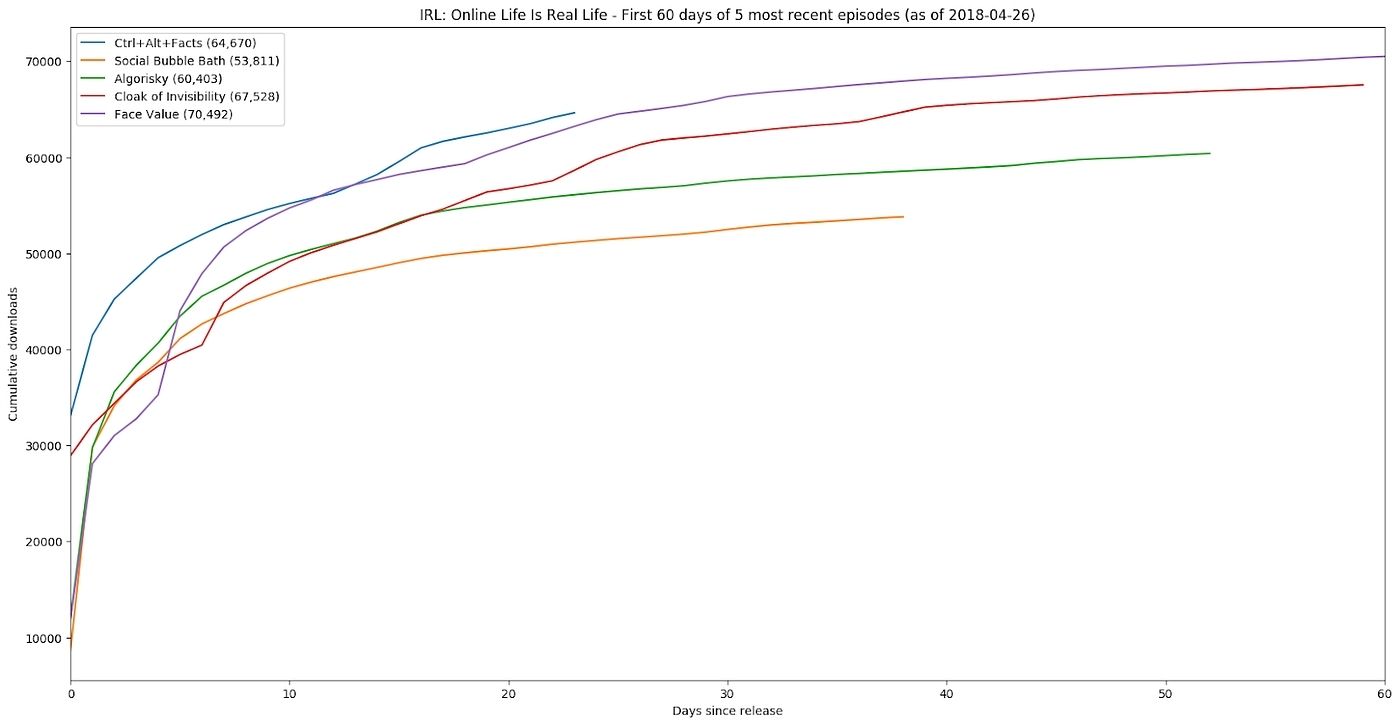Why you shouldn’t compare your podcast to others

Some of the most frequented asked questions in podcasting are “what are benchmarks for a successful podcast?” and “how am I doing relative to other podcasts?” In other words, “how do I know if my podcast is successful?”
We have written a lot about how to measure your podcasts. This post is about why, most of the time, you shouldn’t compare your podcast to others.
Problems with comparisons
- Most shows aren’t after the same audience you are. If you are after a targeted B2B audience and you’re comparing yourself to Planet Money, which is for a broad, mainstream audience, it’s not a fair comparison.
- Most shows didn’t launch at the exact same time your show did. If you are a brand new business show and you’re comparing yourself to hit shows like Masters of Scale or How I Built This, it’s not a fair comparison.
- Most shows don’t have the exact same promotional plan your show does. If you are comparing your new true crime show to Dr. Death or Man In The Window, you have to realize that Wondery has built a huge audience for new true crime shows after the breakout success of Dirty John. Also, they have marketed their shows brilliantly, including billboards, partnerships with media outlets like the LA Times, and co-marketing with Apple. If you don’t have that marketing plan, it’s not a fair comparison.

- Most shows aren’t on the same hosting platform as your show, so they might be counting downloads differently. As Dan wrote about recently, many podcast hosts are currently transitioning (or have recently transitioned) to IAB 2.0 certified download metrics. As a result, comparing your download numbers to the download numbers of a show hosted on another platform isn’t likely a fair apples-to-apples comparison. (Thankfully, this will become much better once the IAB 2.0 transition is complete for all major hosting providers.)
- Many shows don’t share any information about how they are doing publicly. And for the ones that do share their numbers, there is often no way to verify that those numbers are accurate, or again, comparable to how downloads are counted on your hosting platform. Is there any way to verify whether publicly stated downloads are accurate? Are they pre-IAB 2.0 numbers? Are they on the same hosting platform as you? It’s almost certainly not a fair comparison.
If you must compare…
Despite all this, we know that some people will still need to benchmark. So if you have to benchmark, here’s our best advice for how to do it smartly:
- Find a show on the same hosting platform as your show
- Find a show with the same target audience as your show
- Find a show with a comparable marketing plan to your show’s
- Measure the number of downloads after a set period of time. For example, measure how many downloads each show’s first six episodes have after 60 days in market.
- Use completion rates (and not just downloads) as a way to measure editorial effectiveness.
- Of course, to get all this information, you also need to find a show that is willing to share all this data with you, which is not easy.
So benchmarking accurately can be a real challenge.
The best benchmark: compare your podcast… to itself
Our best recommendation for benchmarking is to compare your podcast to itself. That’s right — your best competition is… you.
Dan wrote about episode launch trajectories a while back and we still love them today. Compare your current episodes against your previous episodes, because the best learnings for any podcast have to do with continuous improvement in your own performance.

Are you growing with each new episode? Are you able to see results from your marketing plan? Are you growing your average consumption rate for each episode?
Those are benchmarks we can get behind.
Why are you making this podcast?
Finally, and most importantly, the biggest question any podcaster who is hungry for benchmarks should answer is this: why do I want a benchmark?
- Did you start your podcast to beat Reply All in total downloads? Probably (hopefully) not.
- Is your podcast a failure if another podcast has a bigger audience than you do, even if you have a sizeable audience that listens to all of your episodes at a high average consumption rate? Probably (hopefully) not.
We recommend returning to the reasons why you started your podcast when you get the itch to compare your show to others.
- If you started the show to grow an audience, are you growing an audience?
- If you started the show to build your reputation or change your brand positioning, have you done any research to see if the podcast is achieving this goal?
- If you started the show to simply make an amazing show about a subject you love, are you loving making the show? And are listeners making it through all the shows you’re putting out?
Ultimately, almost everyone has their own specific reasons for making a podcast. So measure yourself against those reasons. And think twice before comparing yourself to other shows, especially when it’s clear that in most cases, you’re comparing apples to watermelons.
Sign up for the Pacific Content Newsletter: audio strategy, analysis, and insight in your inbox. Once a week.
